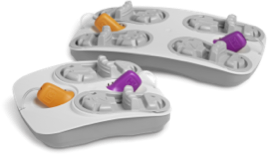Contraindications
- History of anaphylactic or severe systemic hypersensitivity reactions to human IG
- IgA-deficient patients with antibodies to IgA and a history of hypersensitivity to human IG
- Known systemic hypersensitivity to hyaluronidase including Recombinant Human Hyaluronidase of HyQvia
- Known systemic hypersensitivity to human albumin (in the hyaluronidase solution)
Warnings and Precautions
Hypersensitivity: Severe hypersensitivity reactions may occur after treatment with IG products, including HyQvia, even in patients previously treated with IG products. If a hypersensitivity reaction occurs, discontinue infusion immediately and institute appropriate treatment. IgA-deficient patients with antibodies to IgA are at greater risk of developing potentially severe hypersensitivity reactions, including anaphylaxis.
Thrombosis: Has been reported to occur following treatment with IG products, including HyQvia and in the absence of known risk factors. In patients at risk, administer at the minimum dose and infusion rate practicable. Ensure adequate hydration before administration. Monitor for signs and symptoms of thrombosis and assess blood viscosity in patients at risk for hyperviscosity.
Immunogenicity of Recombinant Human Hyaluronidase (rHuPH20): Non-neutralizing antibodies to the Recombinant Human Hyaluronidase component can develop. The clinical significance of these antibodies or whether they interfere with fertilization in humans is unknown.
Aseptic Meningitis Syndrome: Has been reported to occur with use of IG, including HyQvia. The syndrome usually begins within several hours to two days following IG treatment.
Conduct a thorough neurological exam on patients exhibiting signs and symptoms, to rule out other causes of meningitis. Discontinuing IG treatment has resulted in remission within several days without sequelae.
Hemolysis: HyQvia contains blood group antibodies which may cause a positive direct antiglobulin reaction and hemolysis. Monitor patients for signs and symptoms of hemolysis and delayed hemolytic anemia and, if present, perform appropriate confirmatory lab testing.
Renal Dysfunction/Failure: Acute renal dysfunction/failure, acute tubular necrosis, proximal tubular nephropathy, osmotic nephrosis may occur with IG products, including HyQvia. Ensure patients are not volume depleted prior to infusion. Ensure patients are not volume depleted prior to infusion. In patients at risk due to pre-existing renal insufficiency or predisposition to acute renal failure, administer HyQvia at the minimum rate of infusion practicable. Assess renal function before initiation and throughout treatment, and consider lower, more frequent dosing. If renal function deteriorates, consider discontinuation.
Spread of Localized Infection: Do not infuse HyQvia into or around an infected area due to potential risk of spreading a localized infection.
Transfusion-Related Acute Lung Injury: Non-cardiogenic pulmonary edema may occur with IV administered IG. Monitor patients for pulmonary adverse reactions. If suspected, perform appropriate tests for presence of anti-neutrophil and anti-HLA antibodies in both product and patient serum. Manage using oxygen therapy with adequate ventilatory support.
Transmittable Infectious Agents: Because HyQvia is made from human plasma, there is a risk of transmitting infectious agents (e.g. viruses, other pathogens).
Interference with Lab Tests: False positive serological test results and certain assay readings, with the potential for misleading interpretation, may occur as the result of passively transferred antibodies.
Adverse Reactions
The most common adverse reactions observed in >5% of patients in the clinical trials were: Local reactions, headache, antibody formation against rHuPH20, fatigue, nausea, pyrexia, and vomiting.
Drug Interactions
Passive transfer of antibodies may transiently interfere with the immune responses to live attenuated virus vaccines (e.g., measles, mumps, rubella, and varicella).
Use In Specific Populations
Pregnancy: Limited human data are available on the use of HyQvia during pregnancy. The effects of antibodies to the Recombinant Human Hyaluronidase on the human embryo or fetal development are unknown. It is not known whether HyQvia can cause fetal harm when administered to a pregnant woman or if it can affect reproductive capacity. HyQvia should be given to a pregnant woman only if clearly needed.
Please click for Full Prescribing Information.
HyHub/HyHub Duo Important Information for Healthcare Providers
Intended Use: HyHub/HyHub Duo are stand-alone, single-use, disposable vial access devices.
Indications for Use: HyHub/HyHub Duo are indicated for patients 17 years of age and older to allow HyQvia to be transferred from vials without using a needle, as prescribed, in a home environment or clinical setting.
Contraindications:
- Do not use HyHub/HyHub Duo with a pooling bag.
- Do not connect HyHub/HyHub Duo to a syringe driver infusion pump.
Selected Information for Patients:
- HyHub/HyHub Duo are for SINGLE USE ONLY, even if all docks are not used during a single infusion. Re-use will increase risk of infection. Patients should always use a new HyHub/HyHub Duo for each infusion.
- Only use HyHub/HyHub Duo when patients are ready to administer HyQvia.
- Patients should not use HyHub/HyHub Duo at home until receiving instructions and training from a healthcare provider.
- HyQvia is the only medication that may be used with HyHub/HyHub Duo.
- Patients should not exceed the maximum infusion volume per infusion site or infusion rate as indicated in the HyQvia prescribing information.
For safe and proper use of HyHub/HyHub Duo, please refer to the complete Instructions for Use included with the devices. For information about HyQvia, please see Prescribing Information for HyQvia.


 , and
, and  are trademarks or registered trademarks of Takeda Pharmaceutical Company Limited. HYQVIA is a registered trademark of Baxalta Incorporated. HYHUB and MYIGSOURCE are trademarks of Baxalta Incorporated.
are trademarks or registered trademarks of Takeda Pharmaceutical Company Limited. HYQVIA is a registered trademark of Baxalta Incorporated. HYHUB and MYIGSOURCE are trademarks of Baxalta Incorporated.